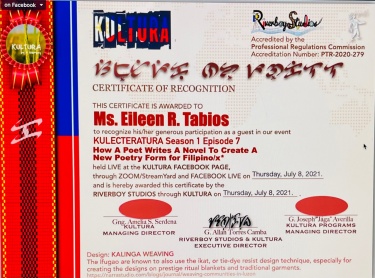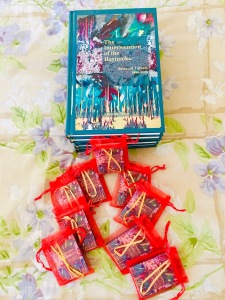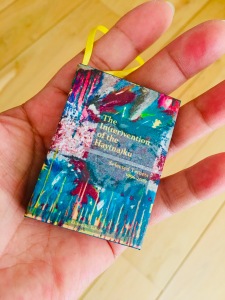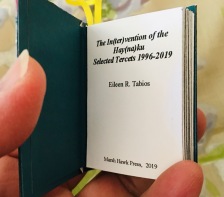The In(ter)vention of the Hay(na)ku: Selected Tercets 1996-2019
ISBN: Paperback: 978-0-9969912-5-4; Hardcover: 978-0-9969911-6-2
Price: Paperback: $18.00; Hardback: $29.95
Edition: Paperback Release: 2021; Hardback (Released 2019 but now Out-of-Print)
Pages: 240
Distributors: Amazon, Thrift Books, Ebay, Marsh Hawk Press, among others. You can also request a signed copy from the Author
The In(ter)vention of the Hay(na)ku: Selected Tercets 1996-2019 presents tercets that Eileen R. Tabios created during her writing career, a process that led to her invention of the hay(na)ku poetic form. The hay(na)ku has been practiced by poets and visual artists around the world. The collection also presents her tercets in other forms, from the lyric to the experimental, and ends with her take on the Death Poems from East Asian cultures.
SPD Books Recommendation, November 2019
*
Will you bring the scent
of red roses
I left behind
in New York City alleyways
(or has that season yet to pass)?
In my eyes
will you see
Baudelaire’s infinity
he defined as the “sky”
you witness repeatedly
on and in any painting
marked by blue sapphire, lapis
lazuli, indigo, turquoise…sky…?
*
Otoliths, 2019 has featured the book’s Introduction by Thomas Fink. You can see it HERE but here’s an excerpt:
*
SELECTED REVIEWS
Tabios has an important place in the creative arts—as genre creator, poet, performance artist, visual artist, and both art and literature critic. In this latter regard, Tabios has created two online journals, Galatea Resurrects and The Halo-Halo Review, in which she reviews other authors’ literary works. Given the quantity and scope of Tabios’ achievements, no one volume can familiarize a reader with even a fraction of them. But for a cross-section of her poetry and critical acumen, The In(ter)vention is invaluable.
—Lynn Grow, Positively Filipino Magazine, September 2023
*
*
*
The book is well organized and the subjects are broad but spring from specific symbols that work both logically and figuratively. Poems vary from three lines to many pages. There is good variety, a little instruction and much to be discussed in this prism of poems that shares so much light.
—Lynette G. Esposito, North of Oxford, April 1, 2020
—from “Books by Barnard Authors” by Isabella Pechaty, Barnard Magazine, Spring 2020
—Maileen Hamto, The Halo-Halo Review, November 2019
*
One gets that sense that, as free-ranging and transdisciplinary as Tabios is (and she must be to generate so much fresh and innovative text), that she is equally as intimate with these self-same subjects. One can feel the arc of the original inspiration, the spiritual depth-diving with which she engages said subjects to such an extent that the silver thread that holds them is taut enough to pluck and hear the tone as though it were the Music of the Spheres manifestly made.
So make no mistake—Tabios is not innovating and recycling to mask a lack of writing power. Take this tercet, from “listening to what woke me”:
in the city, as summer evaporates off the streets
the stilled, sharp blades of a three-pronged fan
behind the curve of its grated metal mask (27)
Hear the music?
—Joey Madia, New Mystics, Literary Aficionado, and Goodreads, December 2019
*
“The tercet was introduced into English poetry by Sir Thomas Wyatt in the 16th century. It was employed by Shelley and is the form used in Byron’s The Prophecy of Dante. The haiku appeared in Japan in the 13th century and was popularised by Bashō much later. As the title of Tabios’ book suggests, its contents are not just invention but also an intervention: the insertion of something new between what has become familiar. It also carries with it the implication of improvement, of advancement in progress by a third party. Tabios’ explorations of the tercet culminates with the “hay(na)ku”—a poetic form named after a Filipino expression and based on a stanza where the first line is one word, the second line two words, and the third line three words.
—Neil Leadbeater, The Fil-Am, Jan. 28, 2020
*
The In(ter)vention, a cross-section of Tabios’ poetry over a 23-year period, as a result of the author’s genre inventiveness, poetic output, and critical acumen, is an American literary landmark.
—Lynn Grow, The Halo-Halo Review, December 2023
*
Book Launch Video Recording of the 2021 Paperback Edition
Available with link and password at the Marsh Hawk Press website.
From Burt Kimmelman’s Introduction: “Too many readers overlook a poem’s form ironically. Tabios does not. Yet she’s always bending it. ….Joyce found poetry too confining. Tabios must always transcend her own formalisms…. Tabios is intrinsically drawn to form for reasons to do with how aesthetics and thought touch.”
*
Book Presentation and Lecture for KULECTERATURA
July 2021 Event Video available on Facebook.
*
A Miniature Book Version!
Note from Author:
The In(ter)vention… has been annotated into a mini-book version—sized at 1-7/8” x 2.5”—that can work as a Christmas Tree ornament! If you don’t traffic in Christmas or Christmas trees, the ribbon used for hanging on a tree can be used as a bookmark! There are poems within the miniature book.
This miniature book, available in a lovely gift bag, is available for $10 (plus $5 shipping). You can purchase just the miniature book or use its purchase for a credit of $10 off of the larger hardback release priced at $29.95! Yes, this means that for the price of the hardback, you also can get the charming tiny book!
Naturally, books can be signed! If interested in this offer, email me at galateaten at gmail dot com . Offer good while supply of miniature books last!
More pictures available HERE.
A Miniature Book Club was formed in March 2021. The doll Abot Tala clutches The In(ter)vention…’s miniature book:
Recently Noted About Eileen R. Tabios
Eileen R. Tabios is one of the more adventuresome and truly creative poets before the public today. She is absolutely able to write poems in the usual styles and make her works resonate with every reader. But she always is searching for ways to push the use of words into formats or situation that challenge the brain as well as heart.
—San Francisco Review of Books
[Eileen R.] Tabios’ concern for our world is global in its reach.
—Contemporary Literary Review of India
Since the 1990s when I first encountered Eileen Tabios’s poetry, she has continually taken readers on a different journey of creativity with each book. Ms. Tabios is one of the Philippines’ great gifts to the United States… There are many other lines in Tabios’s poetry that intrigue—there always are. Her language is light years ahead of many poets from countries around the world, yet remains accessible and exciting.
—Boston Area Small Press and Poetry Scene
Innovation is not easy. Being innovative and prolific—well, that approaches the ultra rare. And that is why, year after year, I try to do at least one review of Eileen Tabios’s works… // [E]xperience generates new inspirations and new commentary on the state of our arts. Given the use of our lists by Big Data, this particular creative act of Tabios’s might be nothing less than Revolutionary.
—New Mystics Review








